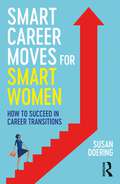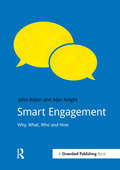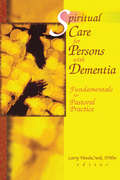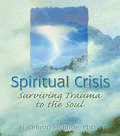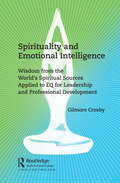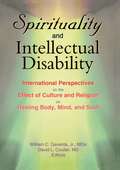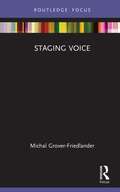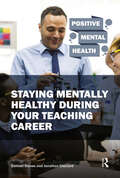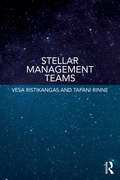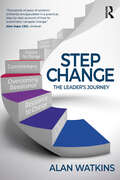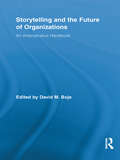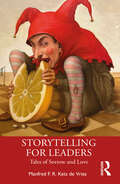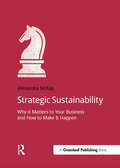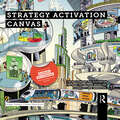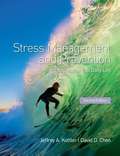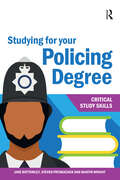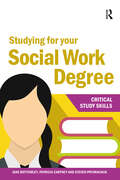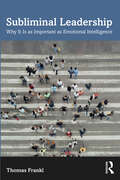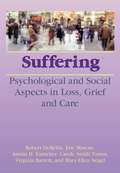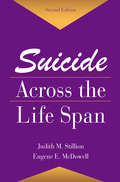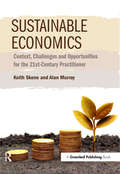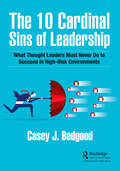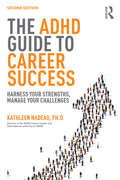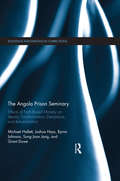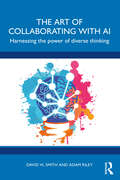- Table View
- List View
Smart Career Moves for Smart Women: How to Succeed in Career Transitions
by Susan DoeringWritten for the businesswoman and professional, this book offers insights and guidance on making the right decisions about career paths and shows ways to strategically prepare for a career transition, be it a promotion, change of sector, setting up one’s own business or even changing careers altogether. Women are looking more and more at a change of work set-up (to ‘at home’ and hybrid models) and what they want out of their careers and wider life. In easy-to-follow steps, this book demystifies the unwritten rules of making a successful career transition. The reader is provided with a highly practical guide to navigating professional changes at all career points and of all types – as well as a toolkit to facilitate the practice of these new skills and approaches. The book encourages professional women to stop, reflect, and do the groundwork on where they want their career to go. It provides the tools to identify what they want, prepare for change, and cultivate the necessary skills and self-confidence key to a successful career transition. The insights and actionable steps contained in this book make it an invaluable resource for professional women looking to achieve success and navigate the transitional stages of their career, re-enter the workplace after a career break, or who simply want to develop the tools and skills to make smart career moves.
Smart Engagement: Why, What, Who and How (Doshorts Ser.)
by Alan Knight John AstonBusinesses that thrive in the 21st century will be those that are smart about "engagement". These businesses are the best at adapting to changing societal concerns, expectations, risks and opportunities and they know how to generate sustainable outcomes.However, while many companies talk a lot about stakeholder engagement, very few do it in a way that genuinely contributes to business success. In many cases companies engage the wrong people on the wrong issues at the wrong time; they plan too much and do too little; they slide into PR-mode or they undermine relationships by creating expectations that can't be met.Smart Engagement can help you plan an engagement programme that is integrated into your core business. John Aston and Alan Knight draw on nearly 50 years of practical expertise in the field of natural resources, energy and infrastructure, chemicals, aeronautics, the financial sector, environmental management, social responsibility and capacity building. They distil the best from current research and offer a robust guide to best practice. This is not abstract process guidelines; it is a straightforward, no-nonsense and practical approach to engagement, focused on results and value creation.
Spiritual Care for Persons with Dementia: Fundamentals for Pastoral Practice
by Larry Van De CreekSpiritual Care for Persons with Dementia explores spirituality in those with dementia to enrich our understanding of the neurological and psychological aspects of hope, prayer, and the power of belief. You will discover how your ministry is vitally relevant to the clinical well-being and quality of life of people with Alzheimer's disease. Spiritual Care for Persons with Dementia provides you with a model spiritual care program for long-term facilities that supplies you with ideas you can implement in your own ministry.You will learn to avoid cognitive pastoral care method that can be hurtful to those suffering with dementia by using new approaches found in Spiritual Care for Persons with Dementia. This book provides you with suggestions about how to spiritually care for people with dementia. These important recommendations include:understanding the value of pastoral contact when ministering to people with a loss of cognitive functions and memorydiscovering the Progressively Lowered Stress Threshold psychosocial model (PLST) that can make important contributions by enhancing the quality of life for people with dementiaproviding pastoral care using nonverbal methods to overcome the barriers of cognitive dysfunctionexploring a client's cognitive and emotional reality on a daily basis to determine how to best interact with him or her gaining insight into how a thorough analysis of the illness and personal religious history can assist in planning religious activities that provide comfort and solace for people with dementia and their familiesSpiritual Care for Persons with Dementia describes religious, theological, and psychodynamic perspectives that will help you to offer better spiritual care for people with dementia. Using your newly acquired skills from Spiritual Care for Persons with Dementia, you will be more effective when ministering to people with Alzheimer's Disease and to their families.
Spiritual Crisis: Surviving Trauma to the Soul
by J Lebron McbrideIt’s no revelation that in today’s world many people suffer from some form of spiritual crisis. But, fortunately, there is hope. In Spiritual Crisis: Surviving Trauma to the Soul, you’ll discover how you can reverse the impact of spiritual crisis and apply healing balm to the traumatized soul. A comprehensive, real-life approach to spiritual care, it gives you the understanding necessary to put a lid on the daily chaos that seeks to destroy those whose lives have been shattered by tragedy, terror, and disillusionment.Written from the perspective of a compassionate professional who has navigated the dark and turbulent waters of his own spiritual crises, Spiritual Crisis represents a loving cross-section of aid from the fields of pastoral theology, psychology, and health care. Christians and non-Christians alike will benefit from its frank approach to aiding troubled souls through the tough times of belief transition, loss of faith, and potentially damaging extremes in living and thinking. Specifically, you’ll read about: understanding the effects and roots of spiritual crisis and trauma coping with loss counteracting disillusionment with the church negotiating belief transitions dealing with religious burnout intervening in denominational identity crisesOftentimes, it’s hard to know what will make a loved one survive or succumb to the impact of seemingly insurmountable personal emergencies. However, this book is a “call to care” that will enable you to help others turn back the tide of debilitating hardship in their lives and restore the tempering unity of mind and body. Whether you’re a beginning pastoral counselor, a marriage and family therapist, or friend of a troubled loved one, Spiritual Crisis will show you and those you work with how to turn crisis into care.
Spirituality and Emotional Intelligence: Wisdom from the World’s Spiritual Sources Applied to EQ for Leadership and Professional Development
by Gilmore CrosbyThis book weaves together spirituality and a systemic version of emotional intelligence that incorporates Kurt Lewin’s social science and other sources. Emotional intelligence calls on us to be fully present “to the moment.” It calls on us to be appreciative of ourselves and our relationships. Likewise, a calm and compassionate presence is almost universally recognized as a spiritual way of being. In other words, the overwhelming majority of the world’s spiritual sources call on us to be emotionally intelligent and that link is explored with unique clarity in this simple yet powerful text. We are all reactive at times. Becoming more objective and less attached allows us to feel our feelings without being a prisoner to acting on them in habitual ways. From a more detached perspective, feelings are neither good nor bad, but simply clues as to how we are perceiving our environment, especially our social environment. This is especially important in terms of our relationships at work. Our perceptions about what people intend trigger our emotional reactions. Think about the difference when you perceive critical feedback as a sincere attempt to help or when you perceive it as an attack of some sort. Perception evokes different emotional responses. Objectivity about our own perception is even more important than objectivity about emotion, because the former usually precedes the later. Paradoxically, being detached allows one to appreciate and experience one’s emotions more fully. Recognizing emotion as part of your inner guidance system instead of as something dangerous that must be controlled or denied is freeing. The less emotion runs you, the more you can accept feeling what you feel. Emotion is a form of physical energy. Fighting your own feelings takes energy. Allowing the ebb and flow of emotion is essential to physical and emotional health and to accepting ourselves as we are.
Spirituality and Intellectual Disability: International Perspectives on the Effect of Culture and Religion on Healing Body, Mind, and Soul
by William C Gaventa David CoulterLearn about inclusive religious practices from around the world!With a multidisciplinary and anthropological perspective, Spirituality and Intellectual Disability: International Perspectives on the Effect of Culture and Religion on Healing Body, Mind, and Soul takes a fresh, innovative look into the world of religious and spiritual practices for the intellectually disabled. Containing vital insights from the first strand on spiritualit and disability at the quadrennial conference of the International Association for Scientific Study of Intellectual Disability (Seattle, 2000), this book provides a framework for bridging the gap between science and faith. It explores the ways in which faith traditions, cultural backgrounds, and professional roles can help bring about a consensus about what spiritual health means within specific cultures and faiths and across disciplines. This informative book examines and provides cutting-edge information on: recognition of spirituality in health care defining and assessing spirituality and spiritual supports perspectives on intellectual disability from Judiasm, Islam, Roman Catholicism, and Native American spirituality creative models of community ministry and religious education liturgical celebrations with people who have severe mental disabilities
Staging Voice (Routledge Voice Studies)
by Michal Grover-FriedlanderStaging Voice is a unique approach to the aesthetics of voice and its staging in performance. This study reflects on what it would mean to take opera’s decisive attribute—voice—as the foundation of its staged performance. The book thinks of staging through the medium of voice. It is a nuances exploration, which brings together scholarly and directorial interpretations, and engages in detail with less frequently performed works of major and influential 20th-century artists—Erik Satie, Bertolt Brecht and Kurt Weill—as well as exposes readers to an innovative experimental work of Evelyn Ficarra and Valerie Whittington. The study is intertwined throughout with the author’s staging of the works accessible online. This book will be of great interest to students and scholars in voice studies, opera, music theatre, musicology, directing, performance studies, practice-based research, theatre, visual art, stage design, and cultural studies.
Staying Mentally Healthy During Your Teaching Career (Positive Mental Health)
by Jonathan Glazzard Samuel StonesThe mental health of teachers in school is just as important as the well-being of the pupils they support. Recent research reveals some alarming statistics, including that 74% of teachers are unable to relax and have a poor work-life balance. This book examines a range of relevant issues including workload, managing behaviour, developing resilience and managing professional relationships in order to address some of these concerns and provide comprehensive guidance and workable, evidence-informed strategies to support all those teaching in schools and colleges.
Stellar Management Teams
by Vesa Ristikangas Tapani RinneManagement teams at all levels, and individual team members in particular, are often disengaged and disconnected from the management function itself. Statements such as, "we lack common goals or they are unclear", "I have no influence", "I am not listened to nor taken into account", and "I do not feel valued – actually, nobody does", are commonplace. The authors argue this is because we have been entrenched in an era of guru leadership but that it must come to an end if our management teams are to rise to the top. An individual is not capable of controlling the complicated system of an organization, with its countless variables, especially in conjunction with the rapid change in both the economy and market forces, which are unpredictable and uncontrollable. No matter how talented the individual, no one person is in a position to manage this complex system alone – not even a guru leader. The authors contend that what is needed now are resilient trendsetters who will bring about a new era of top-performing teams that together form a "collective guru", which they refer to as a Stellar Management Team. In this book, the reader undertakes a metaphorical journey to the stars, which symbolizes top-level interaction and collaboration. The journey is the development from an ordinary management team into a Stellar Management Team, which elevates its operation up to a new level of performance and success.
Step Change: The Leader’s Journey
by Alan WatkinsNo one likes change. Too often it’s viewed as something that must be endured; something to ‘get through’ as fast as possible so that everything can ‘return to normal'. We need to change our view of change and see it for the opportunity it really is. Step Change: The Leader’s Journey helps leaders to become gifted and skilful at moving through the change process gracefully and productively. Based on Joseph Campbell’s 'hero’s journey', Step Change: The Leader’s Journey offers a universal road map of change from step-1 (comfort zone) through to step-12 (post-delivery inspiration). The journey travels through four distinct phases of ‘discover’, ‘decide’, ‘develop’ and ‘deliver’. Step Change provides a proven formula for change, both personal and organisational, which allows us to know where we are on the Change Wheel and what to expect from each step, including what it looks and feels like at each step. By identifying what causes change to fail at each step as well as tools to navigate past the pitfalls and dead ends that leave us stuck at a particular step or retreating to the comfort zone, the change cycle can be understood and mastered. The book provides the ideal structure for senior managers, human resource managers, coaches and business leaders to follow in order to embed change across their teams and organisation.
Storytelling and the Future of Organizations: An Antenarrative Handbook (Routledge Studies in Management, Organizations and Society)
by David M. BojeStorytelling is part of social action and interaction that actually shapes the future of organizations. Organization and management studies have overwhelmingly focused to date on rational narrative structures with beginnings, middles, and ends, where narrative has proved to be a handy concept in qualitative studies. Far less attention is given however to the more spontaneous and ‘non-staged’ storytelling that occurs in organizations. Storytelling and the Future of Organizations explores the science and practice of ‘antenarrative’ because that is how the future of organization is shaped. Antenarrative is a term invented by David M. Boje in 2001, and is defined as a ‘bet on the future,’ as ‘before’ narrative linearity, coherence, and stability sets in. Antenarrative is all about ’prospective sensemaking,’ betting on the future before narrative retrospection fossilizes the past. Antenarrative storytelling is therefore agential in ways that traditional narratology has yet to come to grips with. This handbook contribution is bringing together a decade of scholarship on ‘antenarrative.’ It is the first volume to offer such a varied but systematic examination of non-traditional narrative inquiry in the management realm, organizing and developing its approach, and providing new insights for management students and scholars.
Storytelling for Leaders: Tales of Sorrow and Love
by Manfred F. Kets de VriesStories matter. Written by renowned psychoanalyst, leadership scholar, and executive coach, Manfred Kets de Vries, this book uncovers, explains, and captures the power and art of storytelling at work and in life, and how it can be applied in organizations to powerful effect.Our talent in telling stories makes us more effective. When we talk about events, characters, actions, themes, feelings, and ideas, storytelling is a way to communicate our message. The stories we tell inform, influence, entertain, and shape our lives and those of other people. Using an engaging and storytelling style throughout, the book explores the important role of storytelling, with a particular focus on how it is one of the most important ways to develop leadership skills. Not only does this book present a clear method for improving our storytelling skills, it also explores themes such as the tendency of some people not to live up to their full potential, why people assume an attitude of helplessness, the effects of adversity on human development, why people behave stupidly, the psychological dynamics which affect influencers, the role of sexuality in career management, and what needs to be done to have a fulfilling life.The book is perfect for organizational leaders looking to develop their understanding and skills in the art of storytelling, thereby increasing their effectiveness in positive and powerful ways.
Strategic Sustainability: Why it matters to your business and how to make it happen (Doshorts Ser.)
by Alexandra McKayIn many businesses sustainability is one person’s passion and responsibility. A large part of their job becomes selling sustainability to other people in the business.This book offers arguments, information and tactics will help that person get the buy-in they need to move sustainability forward in their business.Strategic Sustainability: sets out why sustainability matters to businesses – the benefits to you and your stakeholders; shows how to identify the biggest issues, impacts and wins for your business; helps you identify the resources you will need to put sustainability at the heart of your business; outlines key reasons why businesses that are not multinationals should take action on sustainability, and how to do it; looks in detail at how to integrate sustainability with business strategy and mission.Sustainability is of strategic importance to a business. This book makes an airtight case for why action is essential and how sustainability can help a business not only survive but thrive in competitive marketplaces.
Strategy Activation Canvas
by Robert Wreschniok Ansgar ThiessenThe Strategy Activation Canvas is the new standard for accelerating strategies – beginning where classical strategies end: with its activation. While many management and business canvases focus on developing a strategy, the Strategy Activation Canvas helps leaders and decision-makers to bring strategies to life. This book demonstrates for the first time how entire organizations can be “activated”: how people can not only perceive and implement a new strategy, but how entire organizations can be heavily involved in its making, how strategies are made visible and experienced, and how people can play an active and sustaining role throughout bringing a strategy to life. With their decades of experience in large scale organizations, Thiessen and Wreschniok pair their knowledge with case studies from Allianz, Baloise, E.ON, Hamburg Commercial Bank, Microsoft, NORD/LB, Swisscom or Swiss Re, shared by leaders who have remarkably accelerated the success and value of their strategies on the back of strategy activation. This book is an essential resource for managers who have responsibility for strategic initiatives and transformation programs of any kind.
Stress Management and Prevention
by Jeffrey A. Kottler David D. ChenStress Management and Prevention, Second Edition offers a fun and exciting way to learn about stress, its causes, and ways to deal with and prevent it. Not only will you enjoy reading it, but you'll also find yourself motivated to continue incorporating what you learn into your life long after your class is over. You'll explore both Western and Eastern views of stress to learn about its nature, what can trigger it, and the impact it can have on your body and your life. Numerous coping strategies are explored, including problem solving and time management skills, psychological and spiritual relaxation methods, and healthy nutritional and lifestyle choices. Self-reflection and self-awareness exercises, activities, and hands-on techniques will show you how to effectively and easily manage your stress and, most importantly, prevent it from reoccurring. A collection of 17 videos to accompany the text are available here: www.youtube.com/user/routledgetherapy.
Studying for your Policing Degree (Critical Study Skills)
by Martin Wright Jane Bottomley Steven PryjmachukStudying for your Policing Degree is PERFECT for anyone wanting to train to become a police officer. After reading this fully comprehensive guide you will understand: the structure and culture of HE, and how policing fits into it what to expect, and what will be expected of you, as a university student teaching and assessment methods within policing, so that you can perform to the best of your ability in an academic environment how to manage your policing studies in an effective way and make the most of the resources available to you. The books in our Critical Study Skills series will help you gain the knowledge, skills and strategies you need to achieve your goals. They provide support in all areas important for university study, including institutional and disciplinary policy and practice, self-management, and research and communication. Packed with tasks and activities to help you improve your learning, including learner autonomy and critical thinking, and to guide you towards reflective practice in your study and work life. Uniquely, this book is written by a subject specialist and an English for Academic Purposes (EAP) expert.
Studying for your Social Work Degree (Critical Study Skills)
by Jane Bottomley Steven Pryjmachuk Patricia CartneyStudying for your Social Work Degree is PERFECT for anyone wanting to train to become a social worker. After reading this fully comprehensive guide you will understand: the structure and culture of HE, and how social work fits into it what to expect, and what will be expected of you, as a university student teaching and assessment methods within social work, so that you can perform to the best of your ability in an academic environment how to manage your social work studies in an effective way and make the most of the resources available to you. The books in our Critical Study Skills series will help you gain the knowledge, skills and strategies you need to achieve your goals. They provide support in all areas important for university study, including institutional and disciplinary policy and practice, self-management, and research and communication. Packed with tasks and activities to help you improve your learning, including learner autonomy and critical thinking, and to guide you towards reflective practice in your study and work life. Uniquely, this book is written by an experienced social work lecturer and an English for Academic Purposes (EAP) lecturer.
Subliminal Leadership: Why It Is as Important as Emotional Intelligence
by Thomas FranklUnderstanding the power of subliminal influence makes or breaks leaders. What is it that subliminally motivates people to give their best, not just what’s in their job description? How do you build an outstanding team? (Spoiler: it’s not just by putting the best people in a team.) The answer lies in the power of subliminal influence. This book explains in a clear and accessible way this important, yet little known and understood, area of psychology and leadership. As Emotional Intelligence helped managers and leaders to understand the importance of empathy in the workplace, Subliminal Leadership takes us to the next level by explaining how influence through non-verbal communication mostly happens below the threshold of our conscious awareness: subliminal forms of body language and communication which influence other people's attitudes, thinking and behavior – and which may boost, or undermine a leader's authority, the performance of teams or the quality of key customer relationships. Readers will learn how we unconsciously communicate and how we positively or negatively influence other people in the process. Understanding subliminal influence will help people in, or aspiring towards, leadership positions to build trust, understand others’ emotions, make better decisions, and strengthen professional relationships. Based on recent scientific research in disciplines as diverse as psychology, evolutionary biology, anthropology, medicine, neuroscience, and management studies, the book offers a breakthrough, multidisciplinary approach to influence and leadership. This book is for everyone interested in the psychological, biological, and medical dimensions of leadership.
Suffering: Psychological and Social Aspects in Loss, Grief, and Care
by Robert DeBellis, Eric Marcus, Austin H. Kutscher, Carole Smith Torres, Virginia Barrett, and Mary-Ellen SiegelLearn to help others understand, cope with, and even overcome emotional and physical suffering. Suffering: Psychological and Social Aspects in Loss, Grief, and Care is a unique and insightful volume of observations, anecdotes, and case studies about suffering. In this important book, doctors, nurses, teachers, funeral directors, and members of the clergy discuss the crucial physical, emotional, and psychological issues that patients and their families must confront when death is imminent. They address a variety of topics including terminal illness, chronic illness, loss, grief, and pain. Ideal for professionals who work with dying people and their families, Suffering highlights topics that are particularly common when working with AIDS patients, cancer patients, children, the elderly, and the mentally ill.
Suicide Across The Life Span: Premature Exits (Death, Education, Aging and Health Care)
by Judith M. Stillion Eugene E. McDowellFirst published in 1996. The complexities of suicide are examined from the developmental viewpoint. The text includes appropriate case studies, and three research studies, which were conducted especially for this work.
Sustainable Economics: Context, Challenges and Opportunities for the 21st-Century Practitioner
by Alan Murray Keith SkeneThis book marks a milestone in Economics publishing. Sustainable Economics is *the* subject of the moment, as businesses across the globe face up to peak oil prices, climate instability, increasingly complex environmental legislation and the challenge of adapting to a new business landscape. Sustainable Economics: Context, Challenges and Opportunities for the 21st Century Practitioner debugs the language of sustainable development. It explores the strengths and weaknesses of the many and diverse schools of thought. The book enables the modern business student and practitioner to disentangle the complex, often convoluted debate relating to sustainability, and it provides the tools necessary to lead their organizations through the murky waters of current times and prepare for the challenges of the future. Eschewing the linear – take, make and waste – approach of current business and manufacturing thinking, this book revisits the ecological models underpinning recent economic sustainability theory, and re-examines the consequences of modern ecological thought upon business strategies relating to sustainability. A chapter is also dedicated to the "circular economy", already in common parlance at policy levels in the UK, and notably in China and other developing countries.Packed with the most recent research papers, Sustainable Economics is an essential resource for the 21st-century business practitioner and legislator.The book is supported with a large array of teaching and learning material, for both formal and informal use, ranging from role play to data analysis which are available on request with the purchase of this book.
The 10 Cardinal Sins of Leadership: What Thought Leaders Must Never Do to Succeed in High-Risk Environments
by Casey J. BedgoodWhy do some leaders succeed and others fail? Is there a magic ingredient that the leaders must consider in their career journey to ensure the joy ride does not turn into a nightmare? What is the key to maximizing leaders' success in ways that are sustainable long term? The purpose of this book is to provide a simple road map for leaders, aspiring leaders, students, and anyone interested in the art of leadership to succeed in high-risk environments. Often, leaders don’t know what they don’t know. One main culprit is the lack of assessing, measuring, analyzing, and addressing risk. Simply put, we don’t know what we don’t measure. What is not known can and will eventually harm leaders, organizations, and their customers. Change is the new normal and only constant. As change grows, so does risk. Risk can be a friend or foe to thought leaders. It all depends on perspective, insight, and knowledge. Ignorance is never bliss, and leaders must leverage knowledge to mitigate risks at every turn. In The 10 Cardinal Sins of Leadership: What Thought Leaders Must Never Do to Succeed in High-Risk Environments, readers will learn: How to identify, measure, analyze, and address various types of risk How to determine if risk is a friend or a foe Strategic planning concepts that will allow leaders to magnify, plan for, leverage, and marginalize risks long term Methods to ensure that inclusion efforts do not become overly exclusive, thus excluding key stakeholders and creating new levels of organizational risk Techniques for looking back at organizational yesteryears to create a high-performing journey map for the road ahead The value of perspective – how we view things determines how we respond or wait to be disrupted unknowingly
The ADHD Guide to Career Success: Harness your Strengths, Manage your Challenges
by Kathleen G NadeauJust as the classroom poses the greatest challenges for children and teens with ADHD, the workplace is the arena where Adult ADHD poses the greatest threat. And while adults with ADHD are likely to face professional challenges, it is possible to cultivate a work environment that enables them to thrive and uses the strengths of this unique condition to their advantage. Featuring a large open format with summaries at the beginning of each chapter and designed with the ADHD reader in mind, this newly revised and updated edition offers an easy-to-follow progression of useful information interwoven with practical strategies for career success.
The Angola Prison Seminary: Effects of Faith-Based Ministry on Identity Transformation, Desistance, and Rehabilitation (Innovations in Corrections #1)
by Michael Hallett Joshua Hays Byron R. Johnson Sung Joon Jang Grant DuweCorrections officials faced with rising populations and shrinking budgets have increasingly welcomed "faith-based" providers offering services at no cost to help meet the needs of inmates. Drawing from three years of on-site research, this book utilizes survey analysis along with life-history interviews of inmates and staff to explore the history, purpose, and functioning of the Inmate Minister program at Louisiana State Penitentiary (aka "Angola"), America’s largest maximum-security prison. This book takes seriously attributions from inmates that faith is helpful for "surviving prison" and explores the implications of religious programming for an American corrections system in crisis, featuring high recidivism, dehumanizing violence, and often draconian punishments. A first-of-its-kind prototype in a quickly expanding policy arena, Angola’s unique Inmate Minister program deploys trained graduates of the New Orleans Baptist Theological Seminary in bi-vocational pastoral service roles throughout the prison. Inmates lead their own congregations and serve in lay-ministry capacities in hospice, cell block visitation, delivery of familial death notifications to fellow inmates, "sidewalk counseling" and tier ministry, officiating inmate funerals, and delivering "care packages" to indigent prisoners. Life-history interviews uncover deep-level change in self-identity corresponding with a growing body of research on identity change and religiously motivated desistance. The concluding chapter addresses concerns regarding the First Amendment, the dysfunctional state of U.S. corrections, and directions for future research.
The Art of Collaborating with AI: Harnessing the Power of Diverse Thinking
by Adam Riley David VL SmithWe are at a momentous inflection point in our evolutionary history: generative AI is becoming mainstream, transforming the world of work, and specifically that of knowledge workers. This book helps you to navigate your upskilling journey to remain relevant and to add value in the workplace.Knowledge workers must face up to the fact that there is a need to urgently reboot their skill set to survive and thrive in the new AI era. Many of the historic competences and points of differentiation that employees could offer are being challenged with AI technology. This book is all about building the power skills that knowledge workers will need to develop to maintain a competitive edge and work effectively alongside AI. It’s a future where AI will now do a lot of the heavy lifting and one in which employers will increasingly be looking for people to add value in areas where AI is weak. In particular, this puts the spotlight on the need for workers to dial up their potential as polymaths. These are people who can see the big picture from different perspectives and who can add that extra layer of innovative thinking and creativity to everything they do. Importantly, the book provides a framework for understanding how AI is likely to reshape the fundamental structure of the workforce, and how knowledge workers can strategically position themselves to enhance their value.This book provides an essential guide to developing new skill sets for knowledge workers in the AI era. Not only does it ensure that you don’t fall behind, it will also enable you to succeed and thrive.
